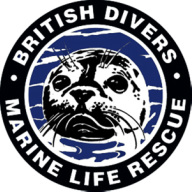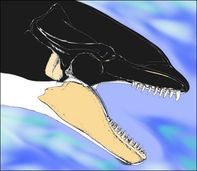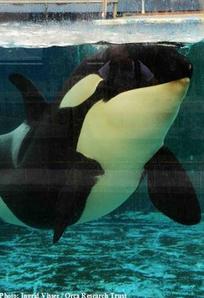Five Conservation Threats Facing Wild Orca
by Orca Aware's Sam Lipman
British Divers Marine Life Rescue

Find out more about our sponsors and the great work they do around the UK coastline, responding to sick, injured and stranded whales, dolphins and seals.
British Divers Marine Life Rescue (BDMLR) is a voluntary network of trained marine mammal medics who respond to call outs from the general public, HM Coastguard, Police, RSPCA and SSPCA and is the only marine animal rescue organisation operating across England, Wales and Scotland. Not only is the charity called upon by the other emergency services, but it also trains their staff.
BDMLR rescue teams are on call 24 hours a day, 365 days a year.
If you find a sick, injured or stranded marine mammal in the UK, please call the BDMLR hotline on 01825 765 546 in hours or 07787 433 412 outside of office hours.
British Divers Marine Life Rescue (BDMLR) is a voluntary network of trained marine mammal medics who respond to call outs from the general public, HM Coastguard, Police, RSPCA and SSPCA and is the only marine animal rescue organisation operating across England, Wales and Scotland. Not only is the charity called upon by the other emergency services, but it also trains their staff.
BDMLR rescue teams are on call 24 hours a day, 365 days a year.
If you find a sick, injured or stranded marine mammal in the UK, please call the BDMLR hotline on 01825 765 546 in hours or 07787 433 412 outside of office hours.
Free Morgan Foundation
In June 2010 a lone female orca calf was captured from the Wadden Sea, off the northwest coast of the Netherlands, under a rehabilitation and release permit. She was emaciated and dehydrated. The “Dolfinarium Harderwijk” took this orca, whom they named Morgan, to their facilities in order to administer medical health care. They weren’t allowed to display her to the public and she was to be prepared for reintroduction back into her natural habitat. Unfortunately, this isn’t what happened.
Morgan currently languishes in Loro Parque, a privately owned entertainment park in the Canary Islands. She is used in shows and is abused by the other orca at the park. There is strong evidence that illustrates that Morgan is a suitable candidate for release back into the wild. Since Morgan’s capture two years ago, the Orca Coalition (comprised of seven NGO’s) and their expert witnesses from the Free Morgan Foundation have been fighting for Morgan’s freedom. The third round of the Court process is now scheduled for the 1st of November, 2012, at 9 am. You can find the Free Morgan Foundation on Facebook and follow on Twitter: @Free_Morgan |
|
Voice of the Orcas

Four ex-SeaWorld orca trainers became disillusioned with the captive marine mammal display industry through their first-hand experiences of it. They all separately reached the same conclusion that it is wrong. This change of heart encouraged them to create a group devoted to providing a voice for those without. The website archives interviews and current events that deal with orca conservation and acitivism.
To learn more about the experiences of VOTO ex-SeaWorld trainers visit
Orca Aware: Blackfish Movie.
To learn more about the experiences of VOTO ex-SeaWorld trainers visit
Orca Aware: Blackfish Movie.
The Orca Project
The Orca Project Corp is a small but effective 501(c)(3) public charity, collaborating with some of the world’s top marine mammal experts and caring professionals from diverse backgrounds, working to change the public’s attitude and government supervision of marine mammals in captivity through research, investigation and education. To learn more about the plight of captive orca visit Orca Aware: Blackfish Movie.
Alexander Sanchez Of PROMAR-Equinac Speak To Fins and Fluke Radio
Alexander Sanchez of Spain's marine animal rescue charity PROMAR-Equinac speaks with Fins and Fluke Radio about his experiences working with marine mammals, as well as of his recent visit to the marine mammal entertainment park in Tenerife where wild-caught Norwegian orca Morgan is being confined. To find out more about Morgan, visit www.freemorgan.org.
IUCN Red List of Endangered Species: Orcinus orca
Orca are currently classified as Data Deficient in the IUCN Red List, due to the lack of sufficient data for populations worldwide (IUCN 2008).
Orca Conservation Listings in the UK
Orca are protected under UK and EU law. In the UK, orca are classified as a Priority Species in the UK Biodiversity Action Plan and are protected under schedule 5 of the Wildlife and Countryside Act 1981, as well as the Nature Conservation (Scotland) Act 2004. Orca are also protected under the Conservation Regulations of Northern Ireland 1998 and by the 1992 EU Habitats and Species Directive. They are listed in Appendix II of the Convention on International Trade in Endangered Species of Wild Fauna and Flora (CITES) (search by genus and species) and in Appendices I and II of Convention on Migratory Species (CMS).
Classed as a European Protected Species (EPS) under schedule 2 of The Conservation of Habitats and Species Regulations 2010, orca are also listed under section 2 Conservation (Natural Habitats &c.) Regulations 1994 (the 'Habitat Regulations' as amended in Scotland).
In offshore waters (greater than 12 nautical miles from land) cetaceans are protected by the Offshore Marine Conservation (Natural Habitats, &c.) Regulations 2007.
Classed as a European Protected Species (EPS) under schedule 2 of The Conservation of Habitats and Species Regulations 2010, orca are also listed under section 2 Conservation (Natural Habitats &c.) Regulations 1994 (the 'Habitat Regulations' as amended in Scotland).
In offshore waters (greater than 12 nautical miles from land) cetaceans are protected by the Offshore Marine Conservation (Natural Habitats, &c.) Regulations 2007.
Orca Conservation Listings in the USA
All orca are listed and protected under the Marine Mammal Protection Act (MMPA) 1972.
In 2005, the Southern resident population of Puget Sound were listed as Endangered under the Endangered Species Act (ESA) of 1973. This listing was prompted by a five-year decline between 1996 and 2001, during which time 20% of individuals were lost. In conjunction with this classification, three areas of critical habitat have been designated for the Southern resident population, including the Summer Core Area in Haro Strait and the waters around the San Juan Islands, Puget Sound and the Strait of Juan de Fuca. There are currently only 84 individuals left in this population.
Both the Southern resident and the Alaskan AT1 transient population are listed as MMPA Depleted, meaning that both stocks are below their optimum sustainable population size.
In 2005, the Southern resident population of Puget Sound were listed as Endangered under the Endangered Species Act (ESA) of 1973. This listing was prompted by a five-year decline between 1996 and 2001, during which time 20% of individuals were lost. In conjunction with this classification, three areas of critical habitat have been designated for the Southern resident population, including the Summer Core Area in Haro Strait and the waters around the San Juan Islands, Puget Sound and the Strait of Juan de Fuca. There are currently only 84 individuals left in this population.
Both the Southern resident and the Alaskan AT1 transient population are listed as MMPA Depleted, meaning that both stocks are below their optimum sustainable population size.
Orca Conservation Listings in Canada
In Canada, different populations are listed under the Species at Risk Act (SARA) 2002 Public Registry. Northern resident, transient and offshore populations that visit these waters have been classified as Threatened, and the Southern resident population are listed as Endangered under schedule one of SARA. The Northwest Atlantic / Eastern Arctic population are listed as Special Concern.
Orca Conservation Listings in New Zealand
Orca found in NZ waters are classified as Nationally Critical under the New Zealand Threat Classification System.
Linking Killer Whale Survival and Prey Abundance
Assessing Underwater Noise Levels During Pile-Driving at an Offshore Windfarm and its Potential Effects on Marine Mammals
|
Ford et al. (2010) investigate how survival rates of resident fish-eating orca are strongly correlated with the availability of their preferred prey species, Chinook salmon. They also explore how the degree to which these orca specialise on this one species of salmon may limit their ability to rapidly adapt to changing prey availability.
Gordon et al. (2003) investigate how and why seismic surveys are a conservation threat to orca and other marine mammals. Bailey et al. (2010) investigate how underwater noise from marine renewable developments impacts marine mammals. |


